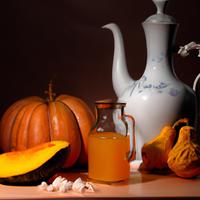
1 serving (250 grams) contains 100 calories, 0.5 grams of protein, 0.1 grams of fat, and 25.0 grams of carbohydrates.

Log this food in SnapCalorie

Nutrition Information
Calories |
94.6 | ||
|---|---|---|---|
% Daily Value* |
|||
| Total Fat | 0.1 g | 0% | |
| Saturated Fat | 0 g | 0% | |
| Polyunsaturated Fat | 0 g | ||
| Cholesterol | 0 mg | 0% | |
| Sodium | 9.5 mg | 0% | |
| Total Carbohydrates | 23.7 g | 8% | |
| Dietary Fiber | 0.5 g | 1% | |
| Sugars | 22.7 g | ||
| protein | 0.5 g | 1% | |
| Vitamin D | 0 mcg | 0% | |
| Calcium | 18.9 mg | 1% | |
| Iron | 0.2 mg | 1% | |
| Potassium | 189.3 mg | 4% | |
* Percent Daily Values are based on a 2,000 calorie diet. Your daily values may be higher or lower depending on your calorie needs.
Food Attributes
Source of Calories
About Orange squash
Orange squash is a concentrated fruit beverage made from orange juice, water, and sugar or artificial sweeteners. Popular in British and South Asian cuisines, it is typically diluted with water or soda before drinking. This vibrant drink delivers a refreshing citrus flavor, making it a favorite for hot weather or casual meals. Nutritionally, orange squash can provide small amounts of vitamin C derived from the juice, though the content varies depending on the concentration of real fruit. However, many commercial varieties are high in added sugars or artificial ingredients, which can make them less healthy for regular consumption. Opting for versions with reduced sugar or natural sweeteners can help mitigate this drawback. Though not a replacement for fresh fruit juice, orange squash is a versatile drink that pairs well with various dishes and offers a nostalgic charm for many who enjoy its tangy sweetness.



